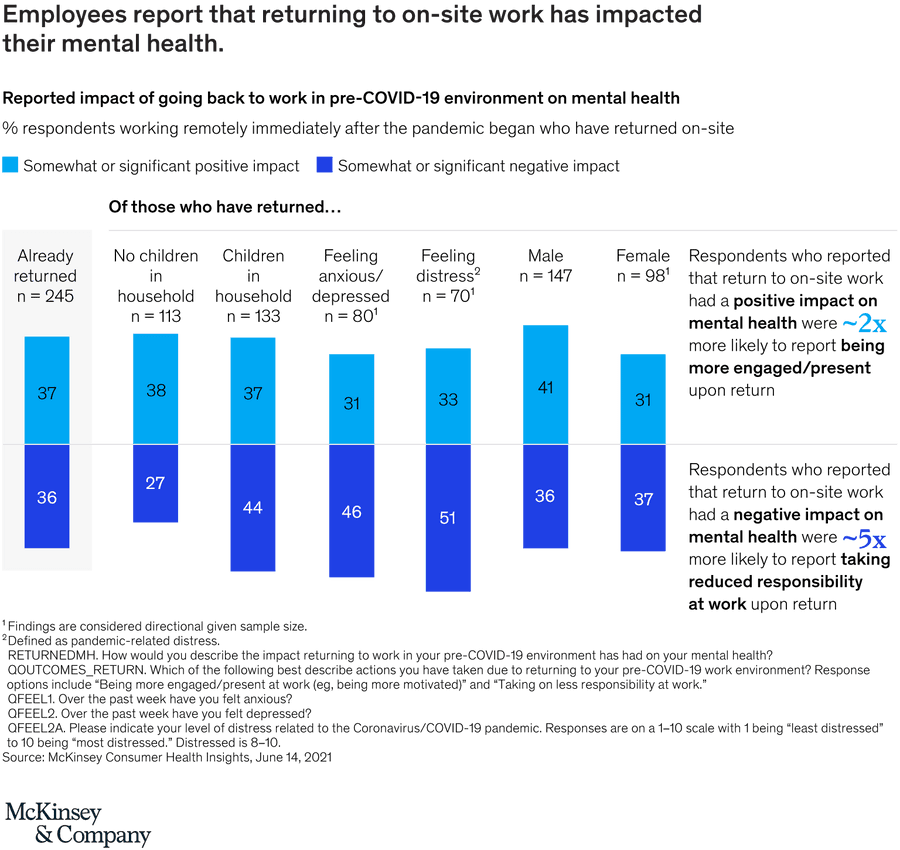Returning to work: Keys to a psychologically safer workplace
Curated from: mckinsey.com
Ideas, facts & insights covering these topics:
4 ideas
·608 reads
6
Explore the World's Best Ideas
Join today and uncover 100+ curated journeys from 50+ topics. Unlock access to our mobile app with extensive features.
Prioritising psychological safety
The workforce is suffering from a rise in mental distress from the pandemic. There is a risk that returning to the workplace will cause millions of people to encounter stress and anxiety.
A new McKinsey survey found that a third of respondents did not want to return back to an office setting as it would negatively affect their mental health.
Employers who prioritise psychological safety in post-pandemic operations can help employees' mental health and attempts to cultivate inclusive workplaces.
7
185 reads
Safety and flexibility
According to the June survey, those who have not returned from remote to on-site work,
- 19% expect that returning will have a positive impact on their mental health
- 49% anticipate going back will have negative effects
Of those who worked remotely during the pandemic and have returned to on-site work,
- 36% reported adverse mental health effects of on-site work
- 37% reported positive effects
- 44% of respondents with children reported negative mental health impact compared with 27% with no children at home
7
149 reads
Interventions
COVID-19 safety and flexible work arrangements could help alleviate stress.
- 62% of respondents requested improved air filtration.
- 60% of employees asked for autonomy in determining when and where work gets done.
- 62% of employees report that additional time off could alleviate stresses associated with returning to work on-site.
7
150 reads
How employers can help
Many organisations are planning lasting changes to operating models and adaptable mindsets to ensure their employees can work in inclusive environments.
- Employers can design strategies that take diverse needs into account.
- Communicating policies clearly and early can help manage anticipatory stress and help employees to plan for changes to their lives.
- Some employers use a test-and-learn approach to flexible and hybrid work and adapt their practices.
- Employees' well-being can be improved by addressing negative attitudes and discriminatory policies.
8
124 reads
IDEAS CURATED BY
CURATOR'S NOTE
Employers can potentially reduce stress and anxiety for workers by considering their on-site return plan.
“
Brian 's ideas are part of this journey:
Learn more about corporateculture with this collection
How to prioritize self-care in the workplace
How to adapt to new work arrangements
How to maintain work-life balance
Related collections
Similar ideas
15 ideas
1 idea
Read & Learn
20x Faster
without
deepstash
with
deepstash
with
deepstash
Personalized microlearning
—
100+ Learning Journeys
—
Access to 200,000+ ideas
—
Access to the mobile app
—
Unlimited idea saving
—
—
Unlimited history
—
—
Unlimited listening to ideas
—
—
Downloading & offline access
—
—
Supercharge your mind with one idea per day
Enter your email and spend 1 minute every day to learn something new.
I agree to receive email updates


